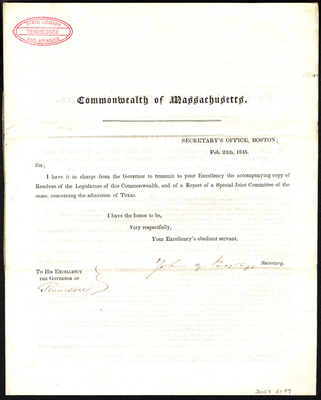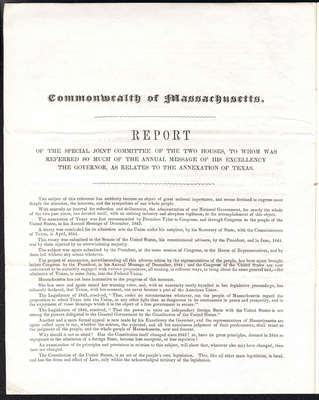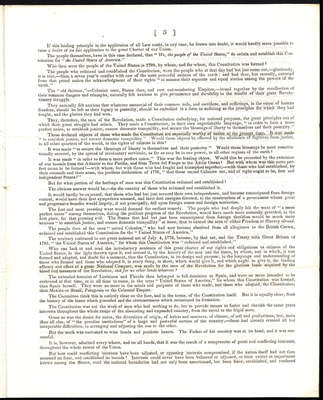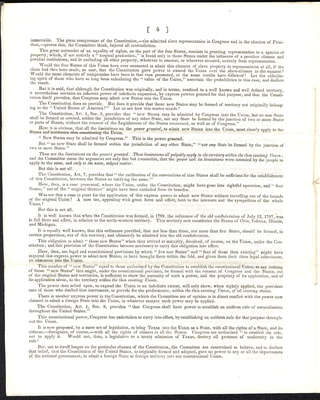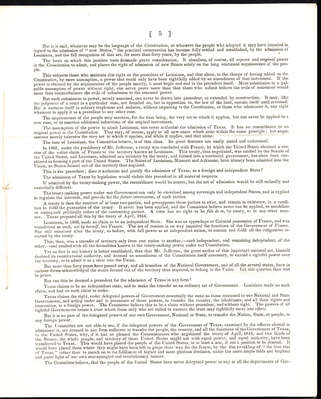Pages
1
Commonwealth of Massachusetts.
SECRETARY'S OFFICE, BOSTON; Feb. 24th, 1845.
SIR; I have it in charge from the Governor to transmit to your Excellency the accompanying copy of Resolves of the Legislature of this Commonwealth, and of a Report of a Special Joint Committee of the same, concerning the admission of Texas.
I have the honor to be, Very respectfully, Your Excellency's obedient servant,
[John G. Palfrey?], Secretary.
TO HIS EXCELLENCY THE GOVERNOR OF Tennessee
2
Commonwealth of Massachusetts.
REPORT OF THE SPECIAL JOINT COMMITTEE OF THE TWO HOUSES, TO WHOM WAS REFERRED SO MUCH OF THE ANNUAL MESSAGE OF HIS EXCELLENCY THE GOVERNOR, AS RELATES TO THE ANNEXATION OF TEXAS.
THE subject of the reference has suddenly become an object of great national importance, and seems destined to engross most deeply the attention, the interests, and the sympathies of our whole people.
With scarcely an interval for reflection and deliberation, the administration of our National Government, for nearly the whole of the two past years, has devoted itself, with an untiring industry and sleepless vigilance, to the accomplishment of this object.
The annexation of Texas was first recommended by President Tyler to Congress, and through Congress to the people of the United States, in his Annual Message of December, 1843.
A treaty was concluded for its admission into the Union under his auspices, by his Secretary of State, with the Commissioners of Texas, in April, 1844.
This treaty was submitted to the Senate of the United States, his constitutional advisers, by the President, and in June, 1844, was by them rejected by an overwhelming majority.
The subject was again submitted by the President, at the same session of Congress, to the House of Representatives, and by them left without any action whatever.
The project of annexation, notwithstanding all this adverse action by th representatives of the people, has been again brought before Congress by the President, in his Annual Message of December, 1844 ; and the Congress of the United States are now understood to be earnestly engaged with various propositions, all tending, in different ways, to bring about the same general end, - the admission of Texas, in some form, into the Federal Union.
Massachusetts has not been inattentive to the progress of this measure.
She has once and again raised her warning voice, and, with an unanimity rarely equalled in her legislative proceedings, has solemnly declared, that Texas, with her consent, can never become a part of the Ameican Union.
The Legislature of 1843, resolved, "That, under no circumstances whatever, can the people of Massachusetts regard the proposition to admit Texas into the Union, in any other light than as dangerous to its continuance in peace and prosperity, and in the enjoyment of those blessings which it is the object of a free government to secure."
The Legislature of 1844, resolved, "That the power to unite an independent foreign State with the United States is not among the powers delegated to the General Government by the Constitution of the United States."
Another and a more formal appeal is now made by his Excellency the Governor, and the representatives of Massachusetts are again called upon to say, whether the solemn, the repeated, and all but unanimous judgement of their predecessors, shal stand as the judgment of the people, and the whole people of Massachusetts, now and forever.
Why should it not so stand? Has the Constitution itself changed since 1843? or, have its great principles, deemed in 1844 so repugnant to the admission of a foreign State, become less energetic, or less repulsive?
An examination of its principles and provisions in relation to this subject, will show that, whatever else may have changed, these have not changed.
The Constitution of the United States, is an act of the people's own legislation. This, like all other mere legislation, is local, and has the force and effect of Law, only within the acknowledged territory of the legislation.
3
[ 3 ]
If this leading principle in the application of all Law could, in any case, be drawn into doubt, it would hardly seem possible to raise a doubt of its fair application to the great Charter of our Union.
The people themselves, have in this case declared, that "We, the people of the United States," do ordain and establish this Constitution for "the United States of America."
Who then were the people of the United States in 1789, by whom, and for whom, this Constitution was formed?
The people who ordained and established the Constitution, were the people who at that day had but just come out, - gloriously, it is true, - from a seven year's conflict with one of the most powerful nations of the earth ; and had thus, but recently, extorted from that proud nation the acknoweledgment of their rights "to assume their seperate and equal station among the powers of the earth."
The "old thirteen," - Colonies once, States then, and now out-numbering Empires,- bound together by the recollection of their common dangers and triumphs, naturally felt anxious to give permanence and durability to the results of their great Revolutionary struggle.
They naturally felt anxious that whatever memorial of their common toils, and sacrifices, and sufferings, in the cause of human freedom, should be left as their legacy to posterity, should be embodied in a form as enduring as the principles for which they had fought, and the glories they had won.
They, therefore, the men of the Revolution, made a Constitution embodying, for national purposes, the great principles out of which their great struggle had arisen. They made a Constitution, in their own imperishable language, "in order to form a more perfect union, to establish justice, ensure domestic tranquillity, and secure the blessings of liberty to themselves and their posterity."
These declared objects of those who made the Constitution are especially worth of notice at the present time. It was made "to establish justice, and ensure domestic tranquillity." Would these objects be effected by the admission of fugitives from justice, in all other quarters of the world, to the rights of citizens in this?
It was made "to secure the blessings of liberty to themselves and their posterity." Would these blessings be most constitutionally secured, by the spread of involuntary servitude, as far as may be in our power, to all other regions of the earth?
It was made "in order to form a more perfect union." This was the leading object. Would this be promoted by the extension of our bounds from the Atlantic to the Pacific, and from Terra del Fuego to the Arctic Ocean? But with whom was this more perfect union to be formed? - with whom, but with those who had fought and triumphed together, - with those who had established, by their counsels and their arms, the perilous declaration of 1776, "that these united Colonies are, and of right ought to be, free and independent States?"
But for what portion of the heritage of man was this Constitution ordained and established?
The obvious answer would be,- for the country of those who had ordained and established it.
It would hardly be expected, that those who had but just secured their own independence, and become emancipated from foreign control, would have their first sympathies aroused, and their first energies directed, to the construction of a government whose great and progressive benefits would largely, if not principally, fall upon foreign states and foreign territories.
The first and most pressing want would demand the earliest remedy. The people who had deeply felt the want of "a more perfect union" among themselves, during the perilous progress of the Revolution, would have been much more naturally provided, in the first place, for that pressing evil. The States that had but just been emancipated from foreign thraldom would be much more anxious "to establish justice, and ensure domestic tranquillity" at home, than to extend the area of either Freedom or Slavery abroad.
The people then of the once "united Colonies," who had now become absolved from all allegiance to the British Crown, ordained and established this Constitution for the "United States of America."
The territory embraced in our great national act of July 4, 1776, became, by that act, and the Treaty with Great Britain of 1783, "the United States of America," for whom this Constitution was "ordained and established."
Who can look at and read the introductory sentence of this great charter of our rights and obligations as citizens of the United States, in the light thrown upon it, and around it, by the history of the men and the times, by whom, and in which, it was formed and adopted, and doubt for a moment, that the Constitution, in its design and purpose, in the language and understanding of those who formed and those who adopted it, in every thing, in short, which would give it, and which ought to give it, the binding efficacy and effect of a great National Compact, was made by the men of the Revolution for the glorious lands acquired by the blood and treasures of the Revolution, and for no other lands whatever?
The extended domains of Louisiana and Florida then belonged in full dominion to Spain, and were no more intended to be embraced at that time, or in all time to come, in the term "United States of America," for whom this Constitution was formed, than Spain herself. They were no more in the minds and purposes of those who made, and those who adopted, the Constitution, than Mexico or Brazil, Patagonia or the Celestial Empire.
The Committee think this is entirely clear on the face, and in the terms, of the Constitution itself. But it is equally clear, from the history of the times which preceded and the circumstances which occasioned its formation.
The Constitution was not hte work of men who had nothing to do, but to provide means to foster and cherish the same great interests throughout the whole range of the abounding and expanded country, from the torrid to the frigid zone.
Great as was the desire for union, the diversities of origin, of habits and manners, of climate, of soil and productions, but, more than all else, of "the peculiar institutions" of a large and powerful section of the country,- these had already created all but insuperable difficulties, in arranging and adjusting the one to the other.
But the work was entrusted to wise heads and patriotic hearts. The Father of his country was at its head, and it was successful.
It is, however, admitted every where, and on all hands, that it was the result of a compromise of great and conflicting interests, throughout the whole extent of the Union.
But how could conflicting interests have been adjusted, or opposing interests compromised, if the nation itself had not then assumed its form, and established its bounds? Interests could never have been balanced or adjusted, or their extent or importance known among the States, until the national boundaries had not only been ascertained, but been fixed, established, and rendered.
4
[ 4 ]
immovable. The great compromise of the Constitution, - the admitted slave representation in Congress and the election of President,- proves this, the Committee think, beyond all contradiction.
This great surrender of an equality of rights, on the part of the free States, consists in granting representation to a species of property, which, if not entirely a "tropical production," is found only in those States under the influence of a peculiar climate and peculiar institutions, and in excluding all other property, whatever in amount, or wherever situated, entirely from representation.
Would the free States of this Union have ever consented to admit this element of slave property to representation at all, if the claim had then been made, as now, that the Constitution gave power to extend the Union over the slave-climate to the equator? Would the same elements of compromise have been in that case presented, or the same results have followed? Let the calculating spirit of those who have so long been calculating the "value of the Union," ascertain the probabilities in this case, and declare the result.
But it is said, that although the Constitution was originally, and in terms, confined to a well known and well defined territory, it nevertheless contains an inherent power of indefinite expansion, by express powers granted for that purpose, and that the Constitution itself provides, that Congress may admit new States into the Union.
The Constitution does so provide. But does it provide that these new States may be formed of territory not originally belonging to the "United States of America?" Let us see how this matter stands?
The Constitution, Art. 4, Sec. 3, provides that "new States may be admitted by Congress into the Union, but no new State shall be formed or erected, within the jurisdiction of any other State, nor any State be formed of the junction of two or more States or parts of States, without the consent of the Legislatures of the States concerned, as well as of Congress."
Here it is obvious, that all the limitations on the power granted, to admit new States into the Union, most clearly apply to the States and territories then constituting the Union.
"New States may be admitted by Congress." This is the power granted.
But "no new State shall be formed within the jurisdiction of any other State," "nor any State be formed by the junction of two or more States."
These are the limitations on the powers granted. These limitations all palpably apply to the territory within the then existing Union ; and the Committee deem the argument not only fair but irresistible, that the power and its limitations were inteded by the people to apply to the same, and only to the same, subject matter.
But this is not all.
The Constitution, Art, 7, provides that "the ratification of the conventions of nine States shall be sufficient for the establishment of this Constitution, between the States so ratifying the same."
Here, then, is a case presented, where the Union, under the Constitution, might have gone into rightful operation, and "four States," out of the "original thirteen" might have been excluded from its benefits.
Was not this a case in point for the application of this express power to admit new States without travelling out of the bounds of the original Union? A case too, appealing with great force and effect, both to the interests and the sympathies of the whole Union?
But this is not all.
It is well known that when the COnstitution was formed, in 1789, the ordinance of the old confederation of July 13, 1787, was in full force and effect, in relation to the north-western territory. This territory now constitutes the States of Ohio, Indiana, Illinois, and Michigan.
It is equally well known, that this ordinance provided, that not less than three, nor more than five States, should be formed, in certain proportions, out of this territory, and ultimately be admitted into the old confederation.
This obligation to admit "these new States" when they arrived at maturity, devolved, of course, on the Union, under the Constitution ; and this provision of Constitution became necessary to carry this obligation into effect.
Here, then, are legal and constitutional provisions by which "five new States" and "four of those then existing" might have required this express power to admit new States, to have brought them within the fold, and given them their clear legal inheritance, an admission into the Union.
This number of "new States" equal to those authorized by the Constitution to establish the constitutional Union, to say nothing of those "new States" that might, under the constitutional provision, be formed with the consent of Congress and the States, out of the original States and territories, is sufficient to show the necessity of such a power, and the propriety of its application, and of its application alone, to the territory within the then existing Union.
The power tehn relied upon, to expand the Union to an indefinite extent, will only show, when rightly applied, the provident care of those who drafted that instrument, to provide for the performance, within the then existing Union, of all existing duties.
There is another express power in the Constitution, which the Committee are of opinion is in direct conflict with the power now claimed to admit a foreign State into the Union, in whatever manner such power may be applied.
The Constitution, Art. 1, Sec. 8, provides "that Congress shall have power to establish an uniform rule of naturalization throughout the United States."
This constitutional power, COngress has undertaken to carry into effect, by establishing an uniform rule for that purpose throughout the Union.
It is now proposed, by a mere act of legislation, to bring Texas into the Union as a State, with all the rights of a State, and its citizens,- foreigners, of course,- with all the rights of citizens in all the States. Congress are authorized "to establish the rule, not to apply it. Would not, then, a legislative or a treaty admission of Texas, destroy all pretence of uniformity in the rule?
But, not to dwell longer on the particular clauses of the Constitution, the Committee are constrained to believe, and to declare that belief, that the Constitution of the United States, as originally formed and adopted, gave no power to any or all the departments of the national government, to admit a forein State or foreign territory into our constitutional Union.
5
[ 5 ]
But it is said, whatever may be the language of the Constitution, or whatever the people who adopted it may have intended in regard to the admission of "new States," the practical construction has become fully settled and established, by the admission of Louisiana, and the full recognition of that act, for more that forty years, by the people.
The basis on which this position rests demands grave consideration. It abandons, of course, all express and original power in the Constitution to admit, and places the right of admission of new States solely on the long continued acquiescence of the people.
This subjects those who maintain this right on the precedent of Louisiana, and that alone, to the charge of having added to the Constitution, by mere assumption, a power that could only have been rightfully added by an amendment of that instrument. If the power is claimed by the acquiescence of the people merely, it must begin and end in the precedent itself. Mere submission to a palpable assumption of power without right, can never prove more than that those who submit believe the evils of resistance would more than counterbalance the evils of submission to the assumed power.
But such submission to power, merely assumed, can never be drawn into precedent, or extended by construction. It may, like the judgment of a court in a particular case, not founded on, but in opposition to, the law of the land, sustain itself until reversed. But it sustains itself in solitary singleness and sadness, without imparting to the Constitution, or those who administer it, any right whatever to apply it as a precedent to any other case.
The acquiescence of the people may sanction, for the time being, the very act to which it applies, but can never be applied to a new case, or to sanction additional infractions of the original instrument.
The assumption of the power to admit Louisiana, can never authorize the admission of Texas. It has no resemblance to an original power in the Constitution. That may, of course, apply to all new cases which arise within the same principle ; but acquiescence merely tolerates the very act to which it applies, and while it applies, and that alone.
The case of Louisiana, the Committee believe, is of this class. Its great features are easily stated and understood.
In 1803, under the presidency of Mr. Jefferson, a treaty was concluded with France, by which the United States obtained a cession of the entire claim of France to the territory known as Louisiana. This treaty, thus negotiated, was ratified by the Senate of the United States, and Louisiana, admitted as a territory by the treaty, and formed into a territorial government, has since been considered as forming a part of the United States. The States of Louisiana, Missouri and Arkansas, have already been admittted into the Union, as States formed out of the territory thus acquired.
This is the precedent ; does it authorize and justify the admission of Texas, as a foreign and independent State?
The admission of Texas by legislation would violate this precedent in all material respects.
If admitted by the treaty-making power, the resemblance would be nearer, but the act of admission would be still radically and essentially different.
The treaty-making power under our Government can only be exercised among sovereign and independent States, and is applied to regulate the interests, and provide for the future intercourse, of such parties.
A treaty is then the contract of at least two parties, and presupposes those parties to exist, and remain in existence, in a condition to fulfil the guaranties of the treaty. It never has been applied, and the COmmittee believe never can be applied, to annihilate or extinguish politically either of the contracting parties. A state has no right to be felo de se, by treaty, or in any other manner. Texas proposed all this by the treaty of April, 1844.
Louisiana, in 1803, made no claim to be an independent State. She was an appendage or Colonial possession of France, and was transferred as such, not by herself, but France. The act of cession in no way impaired the functions of the Government of France. She still remained after the treaty, as before, with full power as an independent nation, to sustain and fulfil all the obligations incurred by the treaty.
This, then, was a transfer of territory only from one nation to another,- each independent, and remaining independent, of the other,- and ratified with all the formalities known to the treaty-making power under out Constitution.
Yet no fact in our history is better established, than that Mr. Jefferson, the great author of this important national act, himself doubted its constitutional authority, and deemed an amendment of the Constitution itself neccessary, to extend a rightful power over the territory, or to admit it as a state into the Union.
But more than forty years have passed away, and all branches of the National Government, and all the several states, have in various forms acknowledged the states formed out of the territory thus acquired, to belong to the Union. Let this question then rest in peace.
But can this be deemed a precedent for the admission of Texas in any form?
Texas claims to be an independent state, and to make the transfer as an ordinary act of Government. Louisiana made no such claim, and had no such claim to make.
Texas claims the right, under delegated powers of Government essentially the same as those entrusted to our National and State Governments, and acting under and in pursuance of those powers, to transfer the country, the inhabitants, and all their rights and immunities, to a foreign power. The Committee believe this to be a claim without precedent, and without right. The powers of all rightful Governments create a trust which those only who are called to execute thae trust may rightfully carry into effect.
But it is no part of the delegated powers of our own Government, National or State, to transfer the Nation, State, or people, to any foreign power.
The Committee are not able to see, if the delegated powers of the Government of Texas, exercised by the officers elected to administer it, are deemed in any form sufficient to transfer the people, the country, and all the functions of the Government of Texas, to the United States, why, if it had so pleased the Commissioners who negotiated the treaty of April, 1844, and two thirds of the Senate, the whole people, and territory of these United States might not with equal power, and equal authority, have been transferred to Texas. This would have placed the people of the United States, in at least a new, if not a position to be desired. It would have placed them where they might have been left to grope their way for the future, by the time dim twinkling of "the lone star of Texas," rather than to march on to the fulfilment of higher and more glorious destinies, under the more ample folds and brighter and purer light of our own star-spangled and revolutionary banner.
The committee believe, that the people of the United States have never delegated power to any or all the departments of Gov-
